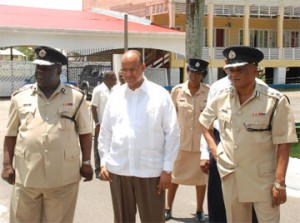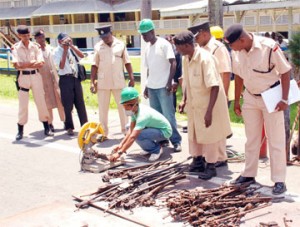– as police destroy old arms
Guyana will strengthen the control of its porous borders and increase security cooperation with its neighbours to help curb the distribution and use of small arms by criminal networks here, Home Affairs Minister Clement Rohee said yesterday as the police destroyed old and outdated firearms.
Rohee’s comments came against the background that both Brazil and Venezuela, countries with which Guyana shares vast, mostly unmanned borders are small arms manufacturers. It has long been surmised that much of the arms and ammunition proliferating in the country at present would have been smuggled through these borders.

Addressing those gathered to witness the destruction of the obsolete firearms at the Police Officers Mess, Eve Leary, Georgetown, Rohee said, “The proportion of homicides committed with a handgun is still relatively high and we need to constantly keep working to bring it down.”
He said government was also moving aggressively to transform the security architecture of the country, a process that has been making an impact on criminality and the criminal underworld.
He noted that small arms control continued to be high on the international agenda and more attention was being paid to the demand reduction aspects of small arms violence.
Quoting local statistics, Rohee said that handguns account for more than 38% of homicides, while shotguns account for 6.5%. He added that only 3.2 per cent of homicides were committed with the use of rifles and other weapons accounted for a similar amount.
According to the minister, in ‘A’ Division, 48.9% of the 279 occurrences involved the use of a firearm. However, he said, law enforcement has also had its successes, finding and seizing illegal firearms on a regular basis.
He revealed that between June and September last year, 104 firearms were seized while for the same period this year, 107 have been seized and that ‘A’ and ‘E & F’ divisions recovered the most. Pointing to the recent weapons find by the joint services on Regent Street, he said it was an indication that the law enforcement agencies have neither given up nor become complacent.

Rohee said those who live and work in the criminal world were already feeling the impact of the work being done as the law enforcement agencies and the joint services were “dealing blow after blow to the criminals and their organizations in Guyana”.
He said efforts which began since in 1993 with the passage of 23 pieces of anti-crime legislation, with four more yet to come, were all part of the transformation in the anti-crime architecture of the country. The minister also promised a heightening of the implementation process of the Citizen’s Security Programme in another six months. He said the programme would bring about a “sea change” in all the law enforcement agencies and their respective technological and human resource capacities. “To all those who are interested I advise you to stay tuned,” Rohee advised.
He also urged that persons ignore the attention still being paid to “those who seem sorry to know that the ‘Fineman’ gang is now virtually decimated.” The minister said that some 30 of the gang members were incarcerated and awaiting trial, 11 dangerous criminals have since been killed in shoot-outs with the joint services and the rest are being “hounded down day and night”.
He said that the network the gang had established was slowly but surely being dismantled. He acknowledged that there were still challenges and that government, “don’t believe in burying our heads in the sand and to pretend that with Fineman’s demise it is now easy sailing. On the contrary, the struggle, the struggle continues. The storm may be over but the sea is still rough. That’s why we have to remain tough.”
Rohee also pointed out that Guyana has since taken the necessary step to establish a task force on narcotics and illicit weapons, which he said was in fulfilment of the United Nations programme of action to prevent, combat and eradicate the illicit trade in small arms and light weapons. He expressed his hope that Guyana would soon endorse the Geneva Declaration and Programme of action on armed violence and development. The declaration represents an important new process, which addresses demand reduction concerns of developing countries who are not manufacturers of such weapons, Rohee said.





